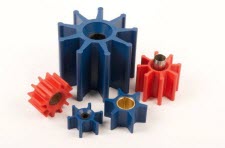(Or, How I Learned to Stop Worrying and Start Loving Non-Metallic Materials)
- What is a composite anyway?
- Are composite impellers the same as plastic?
Much to my dismay, the forum posters almost invariably concluded that composite parts were pretty much the same as plastic -- if not in composition, at least in performance. Oh no! I thought and tried to post to the forums myself, but alas they were not allowing anymore comments. Hence, this month's blog is on why composite parts are so much better than plastic.
What is a composite material?
 What exactly is a composite anyway? Here's a simplified definition from wiseGeek.org:
What exactly is a composite anyway? Here's a simplified definition from wiseGeek.org:
This type of material takes advantage of the different strengths and abilities of its different elements."
In other words, a composite is a blend or mixture of two or more materials, one of which may/may not be plastic, in order to improve the properties of all the materials in the composite. One material in the combo might be chosen for its ability to bend or stretch, while another might be chosen for its strength. Different materials -- anything from wood, to metal, to glass, to plastic, to resins (both organic and man-made), etc. -- can be chosen for their desired properties to create a composite material. It all depends on what you want the end result to be able to do.
Aren't they the same as plastic?
Composites are so much more than the plastic used in picnic ware, drinking glasses and cigarette lighters. Many composites may contain plastics, like thermoplastics, but are mixed with other materials to dramatically change their physical characteristics such as shear and tensile strength, stretch, flexibility, ability to retain their shape (like microfiber foam) -- or other properties.

For instance, our Globe’s Run-Dry® Impellers aren't "plastic." They may look and feel like plastic, but have properties that plastic alone doesn't possess. Due to the mixture of numerous compounds, our impellers are self-lubricating and, as a result, can 'run-dry' in an engine for up to 15 minutes.
Traditional plastic or rubber impellers can bend, snap, or even break into small pieces that get stuck in the engine. Likewise, metal impellers can bend or warp causing the engine to stall.
Here's why composites rock:
 Because of its very nature, a composite's whole is greater than the sum of its parts. Composite materials are like getting the best of both worlds: the strength of one material with flexibility of another yet still retain the shape of a third. (Or, other properties such as coefficient of friction, ability to ward off infection, invisibility to radar … the list goes on and on.) They're like cherry-picking all of the best superhero powers and putting them into one. What plastic can say that?
Because of its very nature, a composite's whole is greater than the sum of its parts. Composite materials are like getting the best of both worlds: the strength of one material with flexibility of another yet still retain the shape of a third. (Or, other properties such as coefficient of friction, ability to ward off infection, invisibility to radar … the list goes on and on.) They're like cherry-picking all of the best superhero powers and putting them into one. What plastic can say that?


